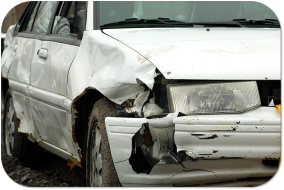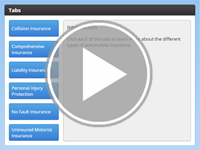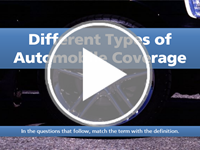
Driving With Protection
 If you have ever been in a car accident, you know that even minor accidents can result of thousands of dollars in damages to your car. However, accidents incur a multitude of other damages and expenses, including:
If you have ever been in a car accident, you know that even minor accidents can result of thousands of dollars in damages to your car. However, accidents incur a multitude of other damages and expenses, including:
- Damage to other cars in the accident
- Property damage
- Medical bills for you, your passengers, and others involved in the accident
- Legal fees for prosecution or defense of charges or civil cases
- Fines for tickets incurred from the accident
If you are in an auto accident, how do you pay for these damages? Hopefully, you have an auto insurance policy, which is a contract or agreement between you and the automobile insurance company that states exactly what the company will financially compensate you for, if you are in an accident. If this is the case, the insurance company may pay for vehicle damage, property damage, medical bills, and/or legal fees that result from the accident.
 The Different Types of Automobile Insurance
The Different Types of Automobile Insurance
By understanding the types of insurance and comparing the services of insurance companies, you will get the best value for your insurance dollars. A good rule is: do not buy insurance for the losses you can afford. Use your limited premium dollars to buy insurance to protect yourself against the losses you cannot afford. Click the player button to launch the interactivity.
Content Practice

![]() Now that you have learned about the different types of automobile coverages, try to match the type with it's description in this interactivity. Click the player button to begin.
Now that you have learned about the different types of automobile coverages, try to match the type with it's description in this interactivity. Click the player button to begin.
 What Factors Affect Your Premium?
What Factors Affect Your Premium?
As with other types of insurance, you have to pay a premium to the insurance company in exchange for your coverages. How do insurance companies determine your premium? Explore this interactivity for information on the factors that affect your premium costs. Click the player button to begin.
View a printable version of this interactivity.
Deductibles usually range from $0-$500. For example, if you have a deductible of $250 when you get in an accident vs. a deductible of $500, your premium will likely be lower for the policy with the higher deductible of $500.
Is there anything that you can do to ensure that your car insurance premiums are not sky high? Yes! Some of the basic precautions you can take to reduce your risk of high premiums:
- Don’t drink and drive and observe the speed limit. Drivers with less legal infractions have lower premiums.
- Concentrate on driving. Don't be distracted by friends, music, or other factors on the road. Distractions can cause accidents.
- Wear your seatbelt. You can protect yourself from injuries if you are in an automobile accident.
- Get good grades in school. Most auto insurance companies offer discounts to high school students with good grades.
Remember, you want to remain in good graces with your insurance company. You can change or cancel your policy, but the insurance company can also modify or cancel your policy. Why would they want to cancel your policy? Below are some of the common reasons that your insurance company may use to justify cancelling your policy:
- You don’t pay your premiums on time
- Your driving license gets suspended
- You receive too many moving violations
- You file false claims against your insurance
There are some drivers who have lost the ability to be insured by companies through their own reckless behavior or other circumstances. These drivers are known as an assigned risk. Assigned risks are drivers who are required by law to be insured, but who cannot attain coverage through an insurance company through traditional methods. Instead, they are assigned to an insurance company by the state's motor vehicle department in order to protect other drivers on the road.


